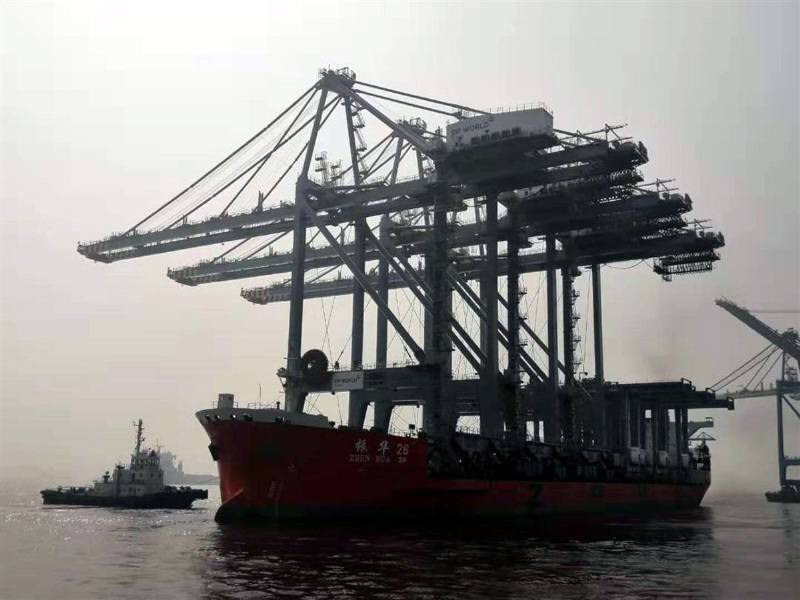GELITZA ROBLES / GUAYAQUIL /
Training. Génesis Márquez (left), Érika Macías (c) and Yolanda Aldaz (right) are trained in simulators to perfect what they have learned abroad.
Training. Génesis Márquez (left), Érika Macías (c) and Yolanda Aldaz (right) are trained in simulators to perfect what they have learned abroad. (Christian Vásconez / Expreso)
Érika Macías hung up the phone and began to cry. She had been unemployed for a year and a half and was called last March, along with three other women, to offer her a job as operator of RTG and QC cranes in the deepwater port of Posorja.
In the country, no woman has handled these huge port cranes. Erika had not even heard of its existence, despite knowing perfectly about motor graders, bobcat sweepers, rollers of affirmed, tampos, trucks 775 g ...
I could not believe it. They had contacted her, who for a year and a half in each place she was going to ask for a job, they always said no. As a teenager, his father and brothers, also operators, taught him everything he knows. I had experience, G-type license, but there was a 'problem' for the contractors: it was a woman.
"I was going to ask for work and they always told me that this was not for me, that these machines are too big for the girls", she recalls now, sitting on the simulator where she is trained for when the port opens, next August, and start to manipulate the cranes in the terminal.
In her native Portoviejo, the 34-year-old only met two other women drivers of heavy machinery, with the same difficulty she had to get a job. That's why he recognizes that despite not having had any idea of what a gantry crane was, he immediately said yes to the proposal.
The same happened to Génesis Márquez. She, Érika, Yolanda Aldaz and Tania Huiñisaca will be the first four women to drive gantry cranes in the country. That port will have 29 male operators.
Genesis is from Venezuela and the same impulse that led her to leave her country, two and a half years ago, made her accept the offer of DP World Posorja, concessionaire of the dock. "I have always liked to travel, to experience new things. I saw the ad and I applied, "says the 28-year-old.
Unlike Érika, Genesis had done the most in life to drive cars, and his last work experience was as a restaurant captain.
Until March 8, she did not know what a QC machine was, which are the ones that move the containers from ship to dock. In the first phase, the deepwater port will have four, the largest in South America, 1,500 tons and 80 meters high.
The Venezuelan at this time already knows every detail of its handling and also of the 15 RTG cranes that will be at the landing, and that will be used for the operation of containers in the yard.
She is second lieutenant of the Venezuelan Navy and she remembers that every time she arrived at a port, she saw those huge metal structures. I never would have believed that one day I would work with them.
Yolanda Aldaz Gálvez did not intend to ride heavy teams either. A tragedy drove her away for a decade from driving backhoes and dump trucks in mines in her native Zamora Chinchipe and in Loja.
Ten years ago, the second of her children had five and suffered an electric shock that left her with third degree burns. "I entrusted myself to the Divine Child and told him that if he saved me, I would dedicate my life to help others." That's how she became a nurse. She was a volunteer and worked in health centers and hospitals in different cities.
This not only drove her away from her land, but also from the roars of motors of the machinery that her father, José Aldaz, drove. As a child, Yolanda walked in dump trucks and looked far from the buildings and work in mines.
As soon as he had the opportunity, he took out the license that allowed him to work for some time on what he loved, until his son became ill. For that reason, manipulating the port cranes makes her doubly happy, because she feels that she is resuming the dream that her father inherited from her.
Tania Huiñisaca is also inevitably thinking of her father when he talks about his passion for heavy machines. He was 10 years old when Ramón Huiñisaca left his house to clean a road in Morona Santiago, where he is from, and never returned. A landslide buried him alive. "He died while being an operator. That meant a lot to me and that's why I decided to be an operator, "says the 25-year-old.
Although every time she got on a backhoe she felt the strange looks of her workmates, she never felt discrimination like Érika. The manabita in countless occasions left crying of the constructions because the engineers made it lower of the equ
https://www.expreso.ec/guayaquil/maquinaria-pesada-mujeres-trabajo-NF2878807?




